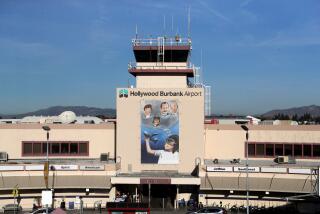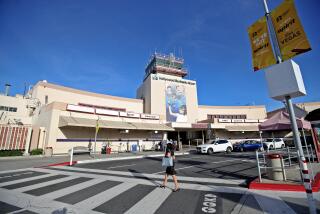United a Good Neighbor
- Share via
United Airlines has decided to be a good neighbor and scrap a new flight scheduled to land at 11:15 nightly, more than an hour past the hotly contested voluntary curfew at Burbank Airport.
All it took to persuade the airline was a plea from the Burbank-Glendale-Pasadena Airport Authority, a letter from a trio of powerful congressmen--Reps. Howard L. Berman (D-Mission Hills), Henry A. Waxman (D-Los Angeles) and Brad Sherman (D-Sherman Oaks)--and some advice from Rep. James E. Rogan (R-Glendale) on how not to manage public relations.
Pessimists would see all this arm-twisting as proof that they can’t trust the voluntary 10 p.m.-to-7 a.m. curfew. Airport opponents clearly have no faith in the ability of the airport’s warring factions to find--and keep--a consensus. They have refused to allow construction of a badly needed new terminal until the airport has a mandatory curfew, one that doesn’t depend on the goodwill of airlines. Such a curfew requires a lengthy study and the approval of the Federal Aviation Administration.
But optimists might disagree and instead point to the power of persuasion to make the voluntary curfew work.
United’s plan to schedule the flight was ill-advised to begin with, true. But the airline deserves credit for having the good sense to reconsider. United officials said they would phase out the new flight, which began on Halloween, by moving the arrival time to 10:55 p.m. by Dec. 15 and 9:47 p.m. by Jan. 8.
Airport neighbors have a legitimate beef about nighttime flights. They are weary of noise and congestion. They raise a reasonable question, which is how busy should an airport be when it’s located in the middle of a developed urban area?
But there is no easy answer to that question. Consider what would happen if every community around every airport in the country set up its own rules and hours. That kind of Balkanization was exactly what the federal law that leaves curfew decisions to the FAA set out to prevent.
FAA Administrator Jane Garvey has acknowledged that balancing national aviation needs with local concerns is the biggest challenge facing the agency. And the agency has not met that challenge. But when a community speaks and an airline listens, as happened last week, it gives hope that the elusive balance between the needs of air commerce and the needs of neighborhoods can be worked out if both sides try. It’s a start, anyway.
More to Read
Inside the business of entertainment
The Wide Shot brings you news, analysis and insights on everything from streaming wars to production — and what it all means for the future.
You may occasionally receive promotional content from the Los Angeles Times.










